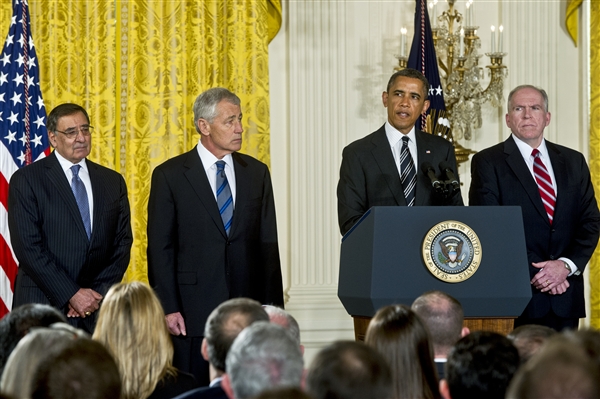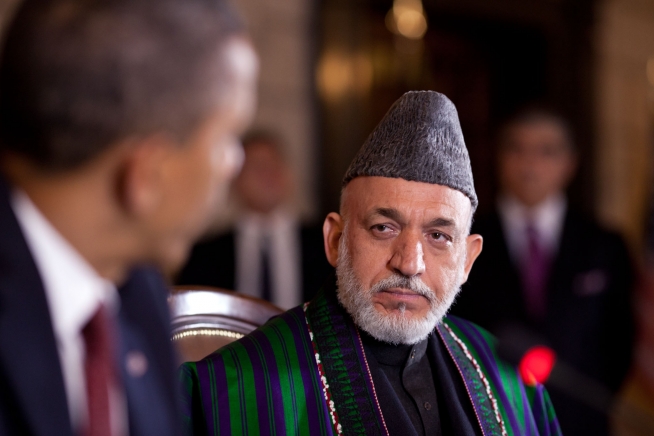
As I’ve noted, Obama’s nomination of Chuck Hagel and John Brennan to Secretary of Defense and CIA Director, respectively, is perfectly in keeping with the Obama foreign policy of the first term. That is, a deep reluctance to get involved in conventional ground wars (with the notable exception of the surge in Afghanistan, of course) and a heavy reliance on covert, “light footprint” militarism, whether through drones, Special Operations forces, or CIA spy work.
Nobody should confuse “light footprint” with a less interventionist foreign policy. The post-WWII Imperial Grand Strategy will continue unabated; US troops will continue to be stationed all over the world, Washington will continue to prop up autocratic regimes in every region of the globe, and while small teams of covert Special Ops aren’t likely to be as big a catastrophe as Bush’s illegal war in Iraq, they are no picnic.
Few have asked how this reiteration of Obama’s first term foreign policy will effect the Latin American region in the next four years. Adam Isacson at Just the Facts speculates:
- More Special Forces deployments to the region. President Obama and his new appointees share a fondness for Special Operations Forces: elite, highly trained, mobile military units used for non-traditional, often clandestine missions ranging from hostage rescues to hunting down wanted individuals to intelligence-gathering and “defense diplomacy.” Special Forces are likely to see their numbers increase despite upcoming defense budget cuts, and as the Afghanistan drawdown proceeds, there will be even more of them available to carry out missions in Latin America. Last year, the New York Times noted, Adm. William McRaven of the Special Operations Command was “pushing hard” to “expand their presence in regions where they have not operated in large numbers for the past decade, especially in Asia, Africa and Latin America.”
- A greater intelligence community presence is another likely consequence of a “light footprint” in Latin America. We can only speculate, but it is reasonable to expect fewer CIA assets in Afghanistan to mean more personnel focused elsewhere, including Latin America. Even more significant may be an increase in the presence of the Defense Intelligence Agency (DIA), the Defense Department’s spy agency. As the Washington Post reported in December, the DIA expects to roughly double the number of clandestine operatives it deploys worldwide over the next few years.
- Greater use of drones and robotics. The Obama administration has expanded the CIA and Defense Department use of armed unmanned aircraft to hunt down suspected terrorist targets. Brennan, the new CIA director, is known for being intimately involved this practice, which is extremely controversial because of reports that the drone program may have killed hundreds of innocent people in Afghanistan, Pakistan and elsewhere.
According to Isacson, “a recent conversation with a Defense Department official confirms that, in the next few years, we are likely to witness an increase in Special Forces training missions in the region.”
“Such deployments fulfill more than just training missions, though,” he warns. “They allow Special Forces units to familiarize themselves with the terrain, culture, and key officers in countries where they might someday have to operate. And they allow U.S. personnel to gather intelligence on their host countries, whether through active snooping or passive observation.”
As we’ve persistently covered for years, Obama’s approach to Latin America has been a familiar one. He has used the ridiculous and failed drug war as a pretext to prop up ugly, military regimes with horrible human rights records throughout Latin America. This has led to some very bloody results in places like Mexico, Honduras, Guatemala, Colombia, and elsewhere.
And why? Dana Frank sheds some light on the true strategic calculus:
The State Department is pursuing such a misguided policy for larger strategic reasons in the region: to push back against the governments in Argentina, Bolivia, Brazil, Ecuador, El Salvador, and others, which have moved considerably to the left in the last 15 years. Above all, Washington’s Honduras policy is a deliberate message to Venezuelan President Hugo Chávez. Endorsing the coup served as a not-so-subtle threat that the others could be next. Paraguay only proves the point further — in June, the State Department looked the other way when Paraguayan President Fernando Lugo was overthrown.
So Washington is afraid of what it has always been afraid of in Latin America: losing control of it. Too many countries are unwilling to simply obey US demands, therefore, support for tyranny is justified. More of any of that is a fine thing for people like Obama, Brennan, Hagel, Kerry, and all of the elite interests tied to Washington. But it’s a terrible thing for the people in Latin America.





 In court on Tuesday, Manning’s defense lawyers tried to get a significantly reduced jail time sentence due to the fact that Manning was held in abusive conditions – solitary confinement 23 hours a day, kept under a strict suicide watch and often ordered to strip naked. The judge
In court on Tuesday, Manning’s defense lawyers tried to get a significantly reduced jail time sentence due to the fact that Manning was held in abusive conditions – solitary confinement 23 hours a day, kept under a strict suicide watch and often ordered to strip naked. The judge 